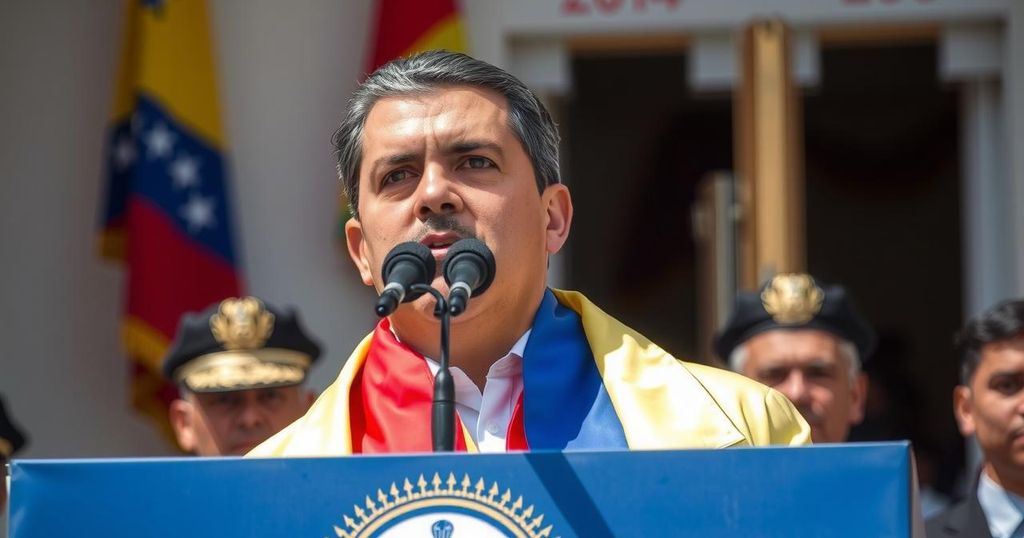Nicolas Maduro has been sworn in for a third term as President of Venezuela, following a disputed election where his opponent, Edmundo Gonzalez, claimed fraud and declared himself the winner. Maduro promises a term of peace and prosperity despite widespread opposition, including protests led by figures such as Maria Corina Machado. The political atmosphere remains tense, with international backlash and ongoing economic challenges impacting Venezuelan society.
President Nicolas Maduro has officially commenced his third term after a election marked by controversy, with claims of voter fraud made by his rival, Edmundo Gonzalez, who purportedly declared himself the victor. Despite facing significant international opposition and sanctions notably from the United States, which recognizes Gonzalez as the legitimate winner of the July elections, Maduro vowed to lead Venezuela towards a period of peace, prosperity, equality, and renewed democracy during his inauguration on Friday. “I swear on history, on my life, and I will fulfil [my mandate],” Maduro stated, underscoring his commitment to adhere to the laws of the country.
The political climate remains volatile, as opposition leader Maria Corina Machado protested against Maduro’s inauguration, emphasizing the resistance against Maduro’s authoritarian tactics. Though she was briefly detained by authorities, she later expressed her determination to continue her fight for change. Maduro’s rise to power since the death of Hugo Chavez in 2013 has been marred by economic turmoil, political repression, and accusations of tyranny, especially following elections characterized by the exclusion of major opposition figures.
The recent elections presented an opportunity for the opposition to potentially displace Maduro, yet the incumbent proclaimed victory with claims of 51 percent of the votes amid a lack of transparency from electoral authorities. In contrast, the opposition has countered these claims with their own reports indicating a significant win for Gonzalez. Despite calls for protests against the inauguration, the turnout was subdued in comparison to those following the electoral results, evidencing the repressive environment under which Venezuelans are compelled to express dissent. Still, the opposition continues to call for resistance against the government and has faced crackdowns, resulting in numerous arrests and fatalities since the election protests.
Nicolas Maduro’s administration in Venezuela has faced heavy scrutiny both domestically and internationally, particularly due to allegations of electoral malpractice and the suppression of opposition voices. Since ascending to power in 2013, Maduro has encountered various economic and humanitarian crises resulting in millions fleeing the country, alongside multiple contested elections. The recognition of opposition leader Edmundo Gonzalez by the United States adds another layer of complexity to Maduro’s rule as he rejects foreign intervention while attempting to stabilize his governance amid local dissent and international sanctions. The historic rivalry between Maduro’s government and the opposition has shaped the current political landscape in Venezuela, fostering a climate of unrest and insecurity.
In conclusion, President Nicolas Maduro’s third term inauguration is emblematic of an ongoing political crisis in Venezuela, characterized by accusations of electoral fraud, repression of dissent, and international condemnation. Despite the challenges presented by opposition figures and the support of foreign allies, Maduro remains assertive in his governance, seeking to project an image of stability while the nation grapples with profound economic distress and public unrest. The future of Venezuela rests on a precarious balance between the government’s efforts to quell opposition and the persistent drive for democratic accountability from those challenging Maduro’s rule.
Original Source: www.aljazeera.com






